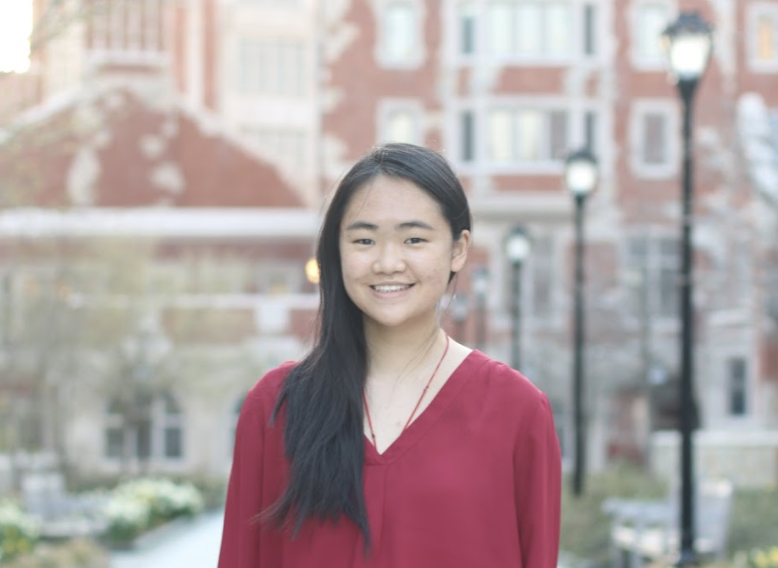
Courtesy of Zoe Hsu
This interview is a part of a five-part series on the Yale College Council candidates running for schoolwide office for the next academic year. The interview, with vice presidential candidate Zoe Hsu ’24, was conducted via email because the candidate was unavailable for a phone interview. Hsu, who is currently a YCC senator, equity chair and Asian Affinity Network co-founder and co-leader, is running alongside YCC presidential candidate Bayan Galal ’23. Her responses have been lightly edited for clarity. You can find Galal and Hsu’s platform at thecheckupyaleneeds.com.
Why are you running?
I am running for vice president to continue the fight for equitable change. For far too long, I’ve continued to witness how inadequate financial aid policies harm my first-generation, low-income community. I’ve witnessed the lack of support for marginalized communities in STEM and ethnic studies. I’ve witnessed the lack of support for women across all fields. And last but not least, I’ve witnessed how my Yale community is harmed by inadequate health care access, weak mental health policies and a lack of considerate academic regulations. I am dissatisfied with the current policies and traditions that Yale has, and I believe that serving as YCC vice president will allow me to not only foster connections with administrators to present these issues, but also increase transparency and communication between the administration and the student body. I also hope to empower other students, particularly those from underrepresented communities, to present their ideas and advocacy to administrators directly because their work is incredibly important.
Despite the hopelessness I might feel when students express their concerns about Yale, my passion for change continues to burn. Why? Because I care about the communities I am part of and the greater Yale community. I want to fight for change, even if my policy proposals are not accepted the first, second or third time. I believe in the Yale community, and I stand by every student and their needs.
What issue matters most to you?
Mental health and the need for financial aid reform both matter equally to me.
This year has been incredibly challenging for the BIPOC community. But when students reach out for emotional support, they are met with a one to two month wait time for a therapist. They are met with a lack of BIPOC and LGBTQ clinicians. I have firsthand waited almost two months for a therapist, only to have a 30-minute default session. These 30-minute sessions are not enough. We must have student input in Yale Mental Health and Counseling in regard to the hiring process. We must hire BIPOC and LGBTQ therapists at every single cultural center, the Women’s Center and the Office of LGBTQ resources, so students can speak to someone who can genuinely relate to their lived experiences.
Financial aid reform is closely connected with mental health. The lack of financial support for all students on financial aid, particularly the FGLI community, has continued to be ignored by administration. Safety Net is exclusive — it only grants money to certain students under certain circumstances. The costs of laundry, graduate school fees, technology, STEM and art supplies and course supplies are incredibly burdensome. A low-income student would not be able to afford a brand-new computer immediately after their computer is broken. The lack of transparency between the Financial Aid Office and the students is an issue that I will immediately address as vice president. There must be accessible, updated information regarding the application process, financial aid documents and other financial aid terms. Refunds are often processed late and financial aid award letters have errors, adding to the impending stress that FGLI students already face, as they are usually financially responsible for supporting their families while completing schoolwork.
What issues do you think matter most to Yalies?
I believe that the top issues that matter most to Yalies are the lack of mental health support in Yale Mental Health and Counseling as well as financial aid reform. We must destigmatize reaching out for emotional support. First, the toxic pressure to appear “successful” at Yale discourages students from reaching out for help, even when they need it. Second, the lack of support and diversity from Yale Mental Health and Counseling further discourages students from reaching out for help. Students are tired of waiting for weeks to be assigned to a therapist. Students are tired of seeing a lack of diversity among therapists and clinicians, especially when BIPOC and LGBTQ students would feel more comfortable speaking with someone with similar backgrounds and experiences.
Another issue is the lack of financial aid transparency and literacy at Yale. Most Yalies are still confused about reapplying for financial aid, how to read an award letter and more.
The institution also does not help cover important costs for necessities such as laundry, textbooks and course materials. Students also have to pay unnecessary expenses, such as the course-drop fee.
A third issue I believe Yalies are thinking about is the lack of academic support, particularly in the STEM and Ethnicity, Race and Migration departments. Not only is there a lack of diversity in STEM departments, but according to the YCC fall 2013 STEM report, many students expressed concerns about the lack of change despite student evaluations. Students of color and/or women in STEM also lack sufficient mentorship; fellowships are limited to a certain number of students, so students have to often resort to using the SEA. The ERM department still lacks adequate resources and funding, despite years of activism amongst Yale students and faculty.
Why are you qualified?
I’ve combined two years of YCC experience into one. I’ve already begun the fight for equitable change. As your Equity Chair, I zealously advocate for my FGLI and BIPOC communities. Highlights of that advocacy include establishing the inaugural textbook stipends program, which provided stipends to 120 students to help offset the cost of expensive books, and leading the Summer Credits Task Force to advocate for free Yale Summer Session courses for FGLI students who were granted housing exceptions due to unsafe circumstances. Further, I argued for lower transcript fees, financial aid reform for Yale Summer Session courses, expansion of Safety Net and lower double-sided printing costs. My efforts have extended to supporting other students working on financial aid reform while serving as a liaison to the Financial Aid Working Group, which meets with the Dean of Undergraduate Admissions and Director of Financial Aid.
As a YCC senator, I addressed COVID-19, mental health and racial injustice. I organized free mental health first aid training for students to become certified to provide emotional support to their close ones. Given that off-campus students do not have access to many COVID-19 resources, I secured personal protective equipment kits for them to protect themselves and the New Haven community. I supported the Justice Impact Movement by drafting a unanimously approved Senate resolution to garner YCC support and writing the comprehensive report that included demands to remove educational barriers for justice-impacted individuals, especially the criminal background inquiry. Because of the unprecedented number of students taking a leave of absence, I collaborated with Academic Strategies to create the first leave-of-absence mentorship database, which is now permanently located on Yale’s advising website.
My lived experiences and challenges being an FGLI women of color in STEM ignited the infectious passion and perseverance to fight for change. I’m not afraid to challenge the administration for the well-being of students. I will stand by Yalies and fight for change, even if change won’t happen after the first, second or third try.
What do you want to get done in your term if you’re elected?
- Mental health reform
- Support student organizations like Mental Health Justice at Yale to place pressure on the institution to follow demands by MHJY; leverage YCC connections to administration and student outreach to support the needs of these student activists
- Hire a mental health fellow at each of the cultural centers, the Women’s Center and the Office of LGBTQ Resources
- Increase access to mental health first aid training to students and first-year counselors
- Financial health
- Short term: Establish YCC stipends for laundry, graduate school fees, course supplies and textbooks
- Greater communication and transparency with Financial Aid Office
- Host drop-in office hours with financial aid representatives
- Host monthly informational sessions regarding reapplying for financial aid or how to read your award letter
- Ensure that refunds for FGLI students are given out in a timely manner and that award letters are accurate
- Long term: Expand safety net to emergency medications, grad school fees, STEM/art supplies, broken computers and textbooks for more students
- Subsidized storage over the summer and breaks
- Affordable storage in residential colleges and/or partner with New Haven storage companies for lower prices
- Subsidized transportation
- Discounts to use Union Station
- Partner with Lyft to give college students Lyft credits
- STEM/academic reform
- Support STEM organizations who are advocating for diversity in departments
- Support for fellowships, such as hiring writing tutors specifically for scientific papers and fellowship applications
- Eliminate course-drop fee
- Create certificates for Ethnicity, Race and Migration as well as Asian American Studies
- YCC reform
- Support local, state and national organizers’ social justice work by hosting fundraisers in conjunction with other institutions and student organizations
- Increase transparency between student body and the YCC by hosting coffee chats for students to be reimbursed for if they meet with a YCC representative
- Allow students to view YCC budget upon request
- Yale and New Haven
- Work with Dwight Hall to expand the number of paid internships for students to support New Haven organizations
- Support organizations demanding that Yale pays its fair share
- Uplift and support the work of Black organizers to abolish the YPD











